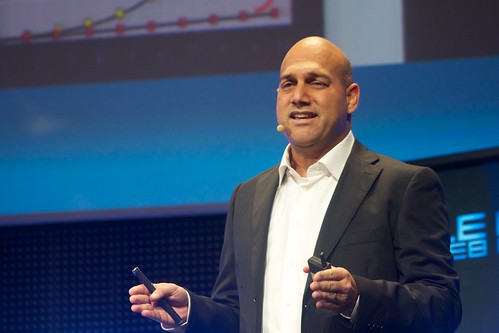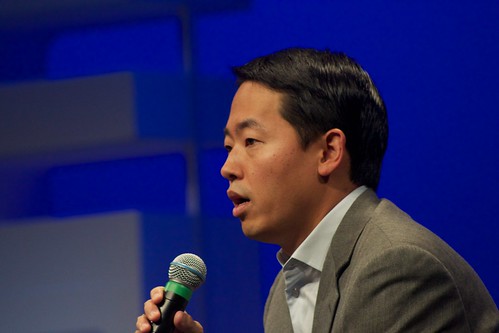How Social is Changing the Gaming Industry
Moderated by: Cedric Ingrand, Broadcaster, Podcaster and Resident Geek at LCI/TF1 in Paris
Panelists: Jens Begemann, Founder, wooga; Nicolas Gaume, Co-founder and CEO, Mimesis Republic; Jimmy Kim, CEO, Nexonova; Mike Kerns, Vice President, Social Games & Personalization, Yahoo!
WARNING: LIVEBLOGGED. some paraphrasing…I may have missed things. Video to follow
CI: FB users clock a billion hours a month on games..it;s a growing areas…so please introduce yourself..
JB: wooga, les than 2yrs, old, do FB games, 15m users, no 7 in world. 55 employees
MK: Yahoo are aware of trends, have partnership with Zynga, distribute games,
NG: building next gen 3d worlds, with platform for social games. have closed beta with 160k users, launching next year
JK: here to talk about games today
CI: when we say social is changing gaming..are we changing gaming as we knew it or creating a new category?
NG: used to make shrinkwrapped games…real games..that is what you say in industry. Games, console game, becomes a product, create a fulfulling service. games are a great way to engage, connect, you can learn more from playing games with someone, have unique power to connect people
CI: it is not taking away from major players?
MK: it is expanding it. games are a core desire. 10-20% were playing..we do games for others
NG: NIntendo opened it up for others, get fit, train brain etc, people play games for hours but don’t feel like playing the games
MK: the distribution has changed..it was more difficult. flash or console. can get richer immersive, in your social network..time spent changes. We are largest games provider online (pre FB) it’s early days, a couple of weeks in Zynga partnership and happy so far
CI: social games, short session, easy play, massive return, engage friends. Is this changing? are they getting longer? does experience evolve
JK: accessibility, like to look at this. Console…need game and console. then need computers to do games..SNS open it up further, embedded. key thing is to enrich..deeper immersive experience
JB: from timeframe, I bet Farmville is played longer than most video games
MK: fantasy sports, started with spreadsheet then moved online. always with friends, now online, more immersive. the market was limited
NG: how much time at movies – play games more?
JB: gameplay session designed, so can be short, little resistance, but see people spending 30min or longer.
CI: what makes a great game? what kind of games to make to address what user group?
NB: should be easy to learn and hard to master, depth. needed. In social it is about the connections, mechanics need to be about portraying social connections…35-45 women are active on facebook, teens different approach, the social connection, projecting on social is different.
CI: FPS are teens/males in the main, older have diff..do you address different user groups
MK: we want to bring different experiences…we don’t design, just distribute. Fantasy football on FB is young men, yahoo games housewives etc
CI: about paying for features?
JK: it is about balance, experience, play etc, cash and virtual cash, we look at microtransactions…we get active users, which includes paying users. have to design experience for level up, access points, mobile extensions ..think content, accessibility and system
CI: how will republic do it
NG: it will be freemium. I made games that costs 60-70million then in a box. it was fine. With good brand and marketing, then would sell. with freemium, as a game designer, it is important to convince all that is worth it, with the audience, they like to try before buy.
CI: freemium assumes 5% to pay?
NG: it is an engagement mechanism that forces you to respect that experience…respect that they are in control of costs, stop at any time
CI: how can you advertise against?
MK: get a lot of advertising, on yahoo games. as with Zynga, see multiple lines of revenue
JB: 2 years ago on FB, theere were lots of advertising on social games, now moving to virtual games.you can build a business around virtual goods. Our audience is 70% women…hear people say makes sell weapons, women decorating! not true, have to sell functional items, that give an advantage in games
CI:brand marketing..does anyone do?
JB: we don’t at the moment, maybe 2011
Jk: blatant advertising turns people off..we look at giving value, with BMW Mini, racing games. has to be value, can’t be plain advertising. once you have that, then good opportunity.
NG: we are talking to brands for launch..have to do value add experience. look at films, you get product placement…gets connection to brand values, if mutually acceptable, then gets value for brand, can connect virtual world to real world, through brands.
CI: platforms…at least 2 of you using FB. is that the ideal platform? can you do it on FB
JB: the key to social games is the social graph…FB is moving towards a monopoly on this. it is essestial, it works like a layer and you can build a business on this. they are in big support of games and they do everything to make sure there are a good experience
MK: I built a business on FB, plus mobile. think mobile will become stronger. we see a huge opp to overlay connectability with graph and with new layers, on top of identity connections from FB
CI: is app on FB, like building on iphone, easy to cut off?
JK: Fb makes it easier to access graph but if you are rely on FB policy – they keep changing this…you need visbility of what platform will be. when stable people will stay
MK: you have to go in with eyes wide open. they want to make a profit, they are aware of need for developers. they are doing better at communicating changes,,,changes impact all.
JK: social graph and FB credits are a good move. for developers, need to see visbility of plan and stability. FB a great platform, but chapter still being written
CI: how to address mobile? different game or cross platform?
JB: have mobile background…did ringtones games etc for 7 years. we will do mobile in 2011, we will do same games as on web, connected via FB, extending the experience, optimising interface for mobile, increasing play frequency
NG: for us, you play on web, virtual world, on PC…mobile can be for follow up experience, enhaced the full experience…
MK: on app discovery for mobile is our focus
JK: 4sq is a game, game experience is not just mobile…can play anywhere, part of lifestyle, part of worlfd designing games we don’t consider mobile version, but extension entwined with users lifestyle
CI: console games are different??? but you can’t say that , EA/Ubisoft etc, not clueless…are they a threat?
NG: it’s a DNA issue..games are a product, structured in a way separate dev and sales. social games are about connecting with uesers iterations etc, hard to shift culture.
CI: look at Nintendo online though,,,
NG: it is hard to change. by aquisition etc, opps to create new paradigm. but it is tough. shareholder expect same revenue..but it’s difficult
JB: EA tried on FB, not successful., so bought playfish instead. looks at top 10 onGFB, no big ones. IP is less important in social games…
NG: people still play hardcore, social won’t replace…


